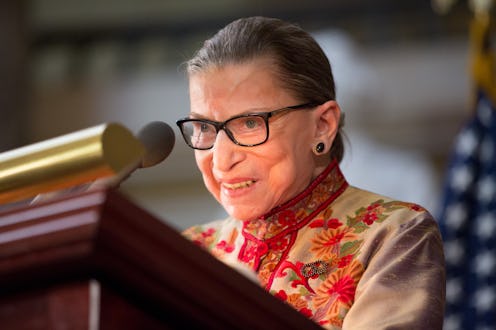News
RBG's Oral Arguments From When She Was A Lawyer Are All Online & Here's How To Listen

You read of Supreme Court Justice Ruth Bader Ginsburg's decisions and dissents. You may have watched On the Basis of Sex, the recently released biopic about her early career. Your breath catches in your throat every time you get a news update about her health. Even if this is the level to which you are a fan of Ginsburg, the internet is still hiding a way for you to learn even more about your legal hero. You can listen to Ruth Bader Ginsburg's oral arguments to the Supreme Court from when she was a lawyer, thanks to the Oyez online multimedia legal archive.
Ginsburg's career was an impressive story of strength in adversity even before she received her nomination to the Supreme Court, as Oyez wrote. Part of her work — in addition to becoming the first woman to receive tenure as a professor at Columbia — was directing the ACLU's Women's Rights Project. The project was at the forefront of expanding women's rights and working against gender discrimination in America. As the ACLU described on its website, the project's focus was working within the legal system in order to enact change — and in real life, that means arguing cases to prove that the Constitution and other federal laws actually do protect the rights of women — they just had to be interpreted as doing so.
If you're curious about what exactly that sounds like, then the Oyez archive is absolutely the perfect resource for you. If you can't listen to RBG's arguments, there's also a transcript available that comes up on the screen as the audio is playing. And above that transcript are the photos of the Supreme Court justices at the time. When one of them asks a question his corresponding photo will light up.
There are a total of six cases in which Ginsburg makes an appearance, and the law nerds among you will love going through and hearing her make the same astute points at an earlier point in her career.
In the Duren v. Missouri case, for example, Ginsburg successfully argued on behalf of a man who had been convicted of murder and robbery by a jury, who claimed that his constitutional rights had been violated because his county allowed women to opt out of jury duty. In the Califano v. Goldfarb case in 1976, Ginsburg was once again successful, arguing that a widower should be entitled to his wife's Social Security survivor's benefits, without regard to gender.
Ginsburg successfully made similar arguments in Edwards v. Healy and Weinberger v. Wiesenfeld, the cases that led the Supreme Court to decide that Social Security benefits could not differ by gender, as that would violate the Fifth Amendment's Due Process clause. Kahn v. Shevin disputed a similar law on a slightly different subject, as at the time Florida gave widows a certain tax benefit that it denied to widowers; Ginsburg claimed that there should be no differentiation by gender, and her case convinced the Supreme Court.
In Frontiero v. Richardson, Ginsburg used the Fifth Amendment again, this time in the case of Sharron Frontiero, an Air Force lieutenant who wanted to claim a dependent's allowance for her husband. Once again, Ginsburg's case helped convince the Supreme Court — or eight of the justices sitting on it, anyway — that the federal regulation preventing that was in fact in violation of the Constitution.
Since arguing these cases, of course, Ginsburg has gone on to become a legal star, beloved by all those who, like her, support the women's rights movement. Listening to these cases, though, provides a valuable look into the early stages of a monumental career.